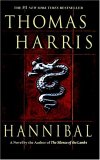Summary | Excerpt | Reviews | Readalikes | Genres & Themes | Author Bio

He rises without sound and carries the American tabloid into the tiny, ornate chapel, built before the discovery of America. As he holds it up to the light of the candles and unfolds it, the religious icons above the altar seem to read the tabloid over his shoulder, as they would in a grocery line. The type is seventy-two-point Railroad Gothic. It says "DEATH ANGEL: CLARICE STARLING, THE FBI'S KILLING MACHINE."
Faces painted in agony and beatitude around the altar fade as he snuffs the candles. Crossing the great hall he has no need of light. A puff of air as Dr. Hannibal Lecter passes us. The great door creaks, closes with a thud we can feel in the floor. Silence.
Footsteps entering another room. In the resonances of this place, the walls feel closer, the ceiling still high--sharp sounds echo late from above--and the still air holds the smell of vellum and parchment and extinguished candlewicks.
The rustle of paper in the dark, the squeak and scrape of a chair. Dr. Lecter sits in a great armchair in the fabled Capponi Library. His eyes reflect light redly, but they do not glow red in the dark, as some of his keepers have sworn they do. The darkness is complete. He is considering. . . .
It is true that Dr. Lecter created the vacancy at the Palazzo Capponi by removing the former curator--a simple process requiring a few seconds' work on the old man and a modest outlay for two bags of cement--but once the way was clear he won the job fairly, demonstrating to the Belle Arti Committee an extraordinary linguistic capability, sight-translating medieval Italian and Latin from the densest Gothic black-letter manuscripts.
He has found a peace here that he would preserve--he has killed hardly anybody, except his predecessor, during his residence in Florence.
His appointment as translator and curator of the Capponi Library is a considerable prize to him for several reasons:
The spaces, the height of the palace rooms, are important to Dr. Lecter after his years of cramped confinement. More important, he feels a resonance with the palace; it is the only private building he has ever seen that approaches in dimension and detail the memory palace he has maintained since youth.
In the library, this unique collection of manuscripts and correspondence going back to the early thirteenth century, he can indulge a certain curiosity about himself.
Dr. Lecter believed, from fragmentary family records, that he was descended from a certain Giuliano Bevisangue, a fearsome twelfth-century figure in Tuscany, and from the Machiavelli as well as the Visconti. This was the ideal place for research. While he had a certain abstract curiosity about the matter, it was not ego-related. Dr. Lecter does not require conventional reinforcement. His ego, like his intelligence quota, and the degree of his rationality, is not measurable by conventional means.
In fact, there is no consensus in the psychiatric community that Dr. Lecter should be termed a man. He has long been regarded by his professional peers in psychiatry, many of whom fear his acid pen in the professional journals, as something entirely Other. For convenience they term him "monster."
The monster sits in the black library, his mind painting colors on the dark and a medieval air running in his head. He is considering the policeman.
Click of a switch and a low lamp comes on.
Now we can see Dr. Lecter seated at a sixteenth-century refectory table in the Capponi Library. Behind him is a wall of pigeonholed manuscripts and great canvas-covered ledgers going back eight hundred years. A fourteenth-century correspondence with a minister of the Republic of Venice is stacked before him, weighted with a small casting Michelangelo did as a study for his horned Moses, and in front of the inkstand, a laptop computer with on-line research capability through the University of Milan.
Excerpted from Hannibal by Thomas Harris. Copyright 1999 by Yazoo Fabrications, Inc. Excerpted by permission of Delacourte Press, a division of Random House, Inc. All rights reserved. No part of this excerpt may be reproduced or reprinted without permission in writing from the publisher.




Give me the luxuries of life and I will willingly do without the necessities.
Click Here to find out who said this, as well as discovering other famous literary quotes!
Your guide toexceptional books
BookBrowse seeks out and recommends the best in contemporary fiction and nonfiction—books that not only engage and entertain but also deepen our understanding of ourselves and the world around us.